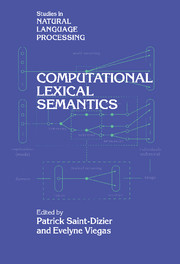Book contents
- Frontmatter
- Contents
- List of contributors
- Preface
- 1 An introduction to lexical semantics from a linguistic and a psycholinguistic perspective
- Part I Psycholinguistics for lexical semantics
- Part II Foundational issues in lexical semantics
- Part III Lexical databases
- Part IV Lexical semantics and artificial intelligence
- 13 Blocking
- 14 A non-monotonic approach to lexical semantics
- 15 Inheriting polysemy
- 16 Lexical semantics: Dictionary or encyclopedia?
- Part V Applications
- Part VI Computer models for lexical semantics
- Author index
- Subject index
13 - Blocking
Published online by Cambridge University Press: 29 September 2009
- Frontmatter
- Contents
- List of contributors
- Preface
- 1 An introduction to lexical semantics from a linguistic and a psycholinguistic perspective
- Part I Psycholinguistics for lexical semantics
- Part II Foundational issues in lexical semantics
- Part III Lexical databases
- Part IV Lexical semantics and artificial intelligence
- 13 Blocking
- 14 A non-monotonic approach to lexical semantics
- 15 Inheriting polysemy
- 16 Lexical semantics: Dictionary or encyclopedia?
- Part V Applications
- Part VI Computer models for lexical semantics
- Author index
- Subject index
Summary
Introduction
A major motivation for the introduction of default inheritance mechanisms into theories of lexical organization has been to account for the prevalence of the family of phenomena variously described as blocking (Aronoff, 1976:43), the elsewhere condition (Kiparsky, 1973), or preemption by synonymy (Clark & Clark, 1979:798). In Copestake and Briscoe (1991) we argued that productive processes of sense extension also undergo the same process, suggesting that an integrated account of lexical semantic and morphological processes must allow for blocking. In this chapter, we review extant accounts which follow from theories of lexical organization based on default inheritance, such as Paradigmatic Morphology (Calder, 1989), DATR (Evans & Gazdar, 1989), ELU (Russell et al., 1991, in press), Word Grammar (Hudson, 1990; Fraser & Hudson, 1992), or the LKB (Copestake 1992; this volume; Copestake et al., in press). We argue that these theories fail to capture the full complexity of even the simplest cases of blocking and sketch a more adequate framework, based on a non-monotonic logic that incorporates more powerful mechanisms for resolving conflict among defeasible knowledge resources (Common-sense Entailment, Asher & Morreau, 1991). Finally, we explore the similarities and differences between various phenomena which have been intuitively felt to be cases of blocking within this formal framework, and discuss the manner in which such processes might interact with more general interpretative strategies during language comprehension. Our presentation is necessarily brief and rather informal; we are primarily concerned to point out the potential advantages using a more expressive default logic for remedying some of the inadequacies of current theories of lexical description.
- Type
- Chapter
- Information
- Computational Lexical Semantics , pp. 273 - 302Publisher: Cambridge University PressPrint publication year: 1995
- 10
- Cited by

